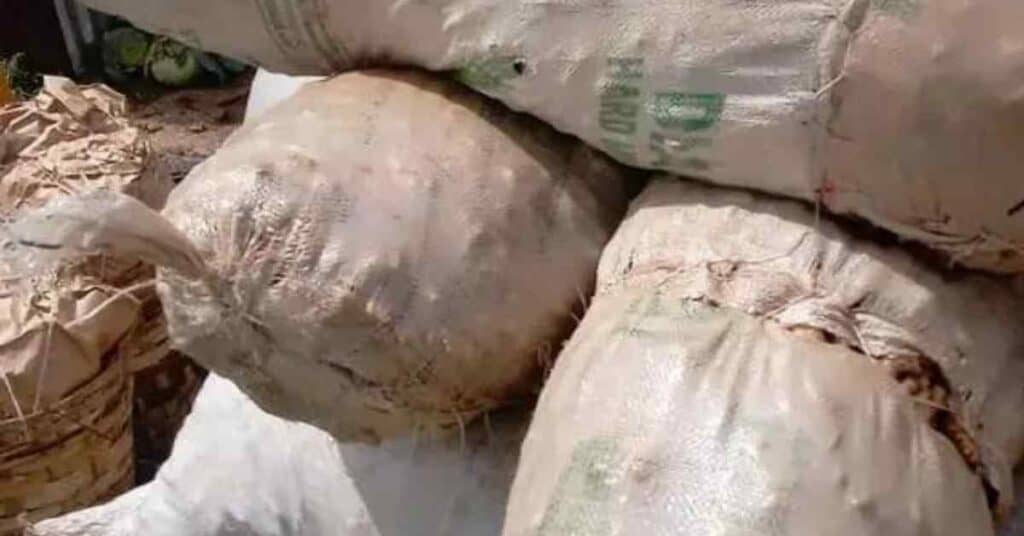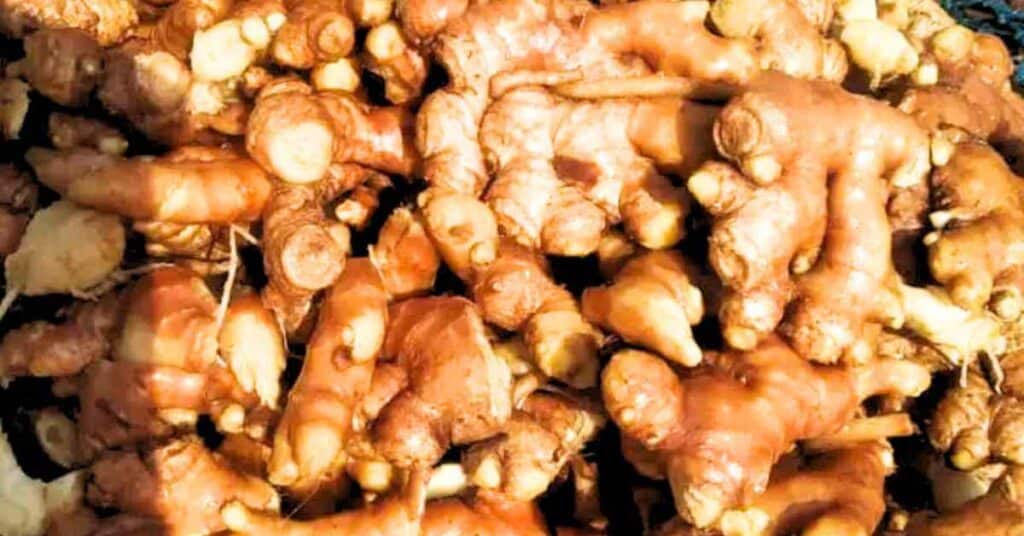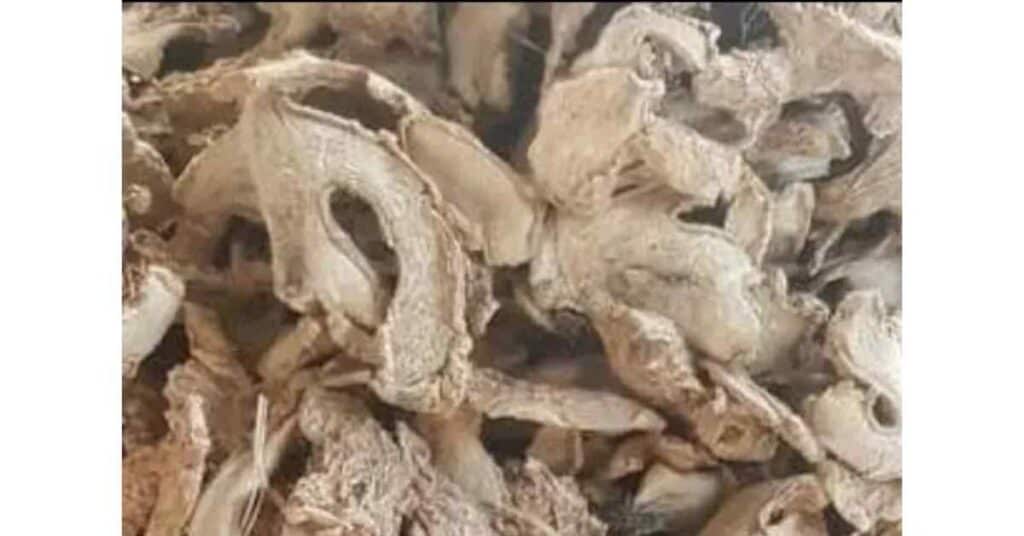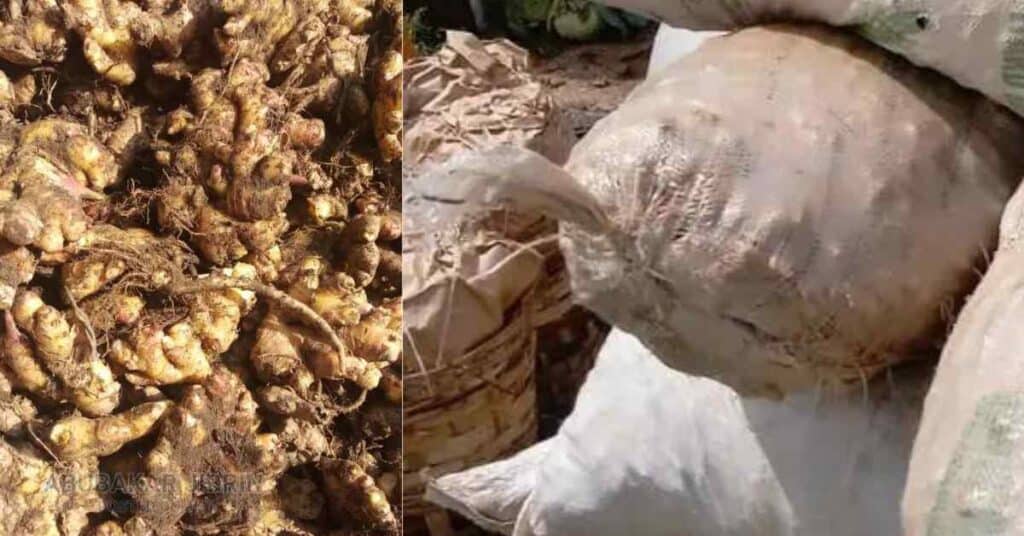If you’re involved in the Nigerian ginger trade, understanding the price of ginger per ton & bag in Nigeria is paramount.
Nigeria, China, Indonesia, and Nepal are the countries that generate the majority of the world’s ginger.
Nigeria is the second greatest producer of ginger in the world, according to PREMIUM TIMES publication.
In addition to being an essential spice, ginger is one of the healthiest plants and is used as a preservative.
Ginger can be found in different forms, including raw ginger, dry ginger, bleached dry ginger, ginger powder, ginger oil, ginger oleoresin, ginger candy, and others.
According to projections, the “Global Ginger” Market will reach $4.8 billion by 2027.
In this post, we are going to look at the Price of Ginger per Ton & per bag in Nigeria, the factors affecting ginger prices, and provide insights to navigate the Nigerian ginger market effectively.
Ginger Prices Per Bag in Nigeria (April 2024)
The current average price for dry ginger in Nigeria is ₦55,000 per bag, while the average price for wet/fresh ginger is ₦35,000 per bag.

The price of ginger per bag in Nigeria depends on the type (fresh or dry) and location.
One major influence that can affect the price of ginger is the place where it is grown. Kaduna, Benue, and Gombe are three of the major states in Nigeria for ginger cultivation.
Local ginger may be more affordable because it is more widely available. However, transportation expenses could impact the final ginger price in your local market if you reside in a place distant from these key production regions.
Ginger Prices Per Ton in Nigeria (April 2024)
In Nigeria, ₦275,000 is the average cost per ton of ginger.
How much ginger costs per ton is heavily dependent on its quality. In general, you may expect to pay more for superior quality ginger, which is typically fragrant and imperfection-free.
Furthermore, ginger’s price is affected by how readily it is available in the market. With a scarcity of supply, prices rise, and with excess supply, prices fall.
Converting Prices Per Bag to Price Per Ton
Considering that ginger is occasionally handled in bulk, it is essential to have a solid understanding of the conversion from per-bag rates to per-ton prices.
Price per Ton: To convert the price per bag to price per ton, multiply the price per bag by the number of bags per ton.
For example, A bag of ginger weighing 20kg
20kg bag of Dry Ginger cost ₦55,000
Number of bags of ginger in a ton = 1000/20 =50
Therefore, there are 50 bags of ginger in a ton, so you will need to multiply the price per bag, which is ₦55,000 by the number of bags, which is 50 bags.
₦55,000 X 50 = ₦275,000/ton.
A similar calculation may be made to determine the price per ton of fresh ginger by taking into account the current price per bag as well as the weight of the bag.
Ginger Prices Per Kg in Nigeria (April 2024)
Ginger may be purchased in Nigeria for a price per kilogram that falls somewhere between ₦2,500 and ₦2,800 on average.
Several factors might influence the price of ginger per kilogram in Nigeria. These factors include the location, the season, and the demand seen in the market. On the other hand, the price might reach ₦3,000 per kilogram during peak seasons or in regions with a large demand for the product.
Factors Affecting Ginger Prices in Nigeria
In Nigeria, the price of ginger changes for some reasons.
Here is a list of the most important factors:
Seasonality: Ginger has clear gathering times, usually from May to September. Price drops can happen during peak harvest when a lot of food is available. On the other hand, prices tend to go up during off-seasons when fewer items are available.
Location: Ginger prices change depending on where you live. Ginger from Kaduna, Kano, and Benue State, which are major ginger-producing areas, often has lower prices because they produce more of it. Prices might be slightly higher in places where ginger isn’t grown as much.
Quality: The price of ginger is greatly affected by how good it is. Fresh, plump, and disease-free ginger sells for more than ginger that is wilted, damaged, or moldy. Because it has been made to last longer, dry ginger usually costs more than fresh ginger.
Market Demand: Changes in demand affect prices. Prices can increase when there is more desire for goods in the country or abroad. On the other hand, if desire goes down, prices might go down.
Transportation Fees: The price of ginger increases because it costs more to get from farms to stores. Transportation prices can be higher for places that are far away, which can change the total price.
Costs of Storing: It costs money to keep ginger, especially fresh ginger, at the right temperature and with enough airflow. These storage costs can be added to the end price.

Ginger Exports from Nigeria
The production of ginger in Nigeria is not limited to the country’s borders. It has secured the position of being the third largest ginger exporter in the world, following China and India. Nigeria is a major exporter of ginger.
In 2021, Nigeria exported ginger worth $12 million (523,000 metric tonnes), equivalent to 14 per cent of the total supply of ginger worldwide. However, it is believed that Nigeria might earn more if that volume of ginger was transformed into ginger oil through steam distillation.
When it comes to flavouring ingredients, ginger oil is utilized in producing beverages, confectionery, and perfumes.
What Countries Does Nigeria Export Ginger To?
Ginger from Nigeria makes its way to many places around the world. Here are some of the most popular places where Nigerian ginger is sent:
India: India buys a lot of ginger from Nigeria because it likes the quality and flavor [WITS – World Integrated Trade Solution].
United States: Another big buyer of Nigerian ginger is the United States, which uses it in cooking and medicine [WITS].
Southeast Asia and the United Arab Emirates: Other places that buy ginger from Nigeria are Southeast Asia and the United Arab Emirates [WITS].
Europe: European countries also like Nigerian ginger, with Germany being a good example [WITS].
Types of Ginger Exported from Nigeria
There are times when fresh ginger is good, but most of Nigeria’s ginger products are dried ginger.
Sun-Dried Split Ginger: This is the type of ginger that Nigeria exports the most. The process is easy; leave the ginger in the sun for a few days [Globexia].
Fresh Ginger: Even though it isn’t sold as often as dried split ginger, Nigeria still sends fresh ginger to other countries [Globexia].
Ginger Powder: To meet the needs of certain markets, some makers go the extra mile and grind dried ginger into powder

What is the demand for ginger in Nigeria?
According to information provided by the Ministry of Agriculture, the amount of ginger produced in Nigeria is estimated to be 31 million metric tons. In contrast, the demand is estimated to be 65 million MT.
This results in a supply-demand gap of 34 million MT.
Ginger from Nigeria is in high demand, driven by domestic consumption and a solid export market. In general, the demand for ginger from Nigeria is strong.
Ginger is a spice that is frequently used in Nigerian cuisine. It imparts its characteristic flavour to various foods, including stews, soups, and rice dinners.
Additionally, ginger is used by some Nigerians for its purported medical properties, which include facilitating digestion and alleviating nausea.
Tips for Getting the Best Price on Ginger in Nigeria
If you want to get the greatest price on ginger in Nigeria, here are some ideas that will help you:
Buy directly from farmers: When possible, you should consider purchasing ginger directly from the farmers as it will help you avoid the markups the middlemen add.
Buy at peak harvest: Prices are often lower during peak harvest seasons due to increased supply as more harvests are available.
Negotiate effectively: You should not be scared to negotiate, especially when purchasing huge amounts. However, you should negotiate successfully.
Compare prices from different vendors: It is important to compare pricing from many vendors.
Obtain estimates from different farmers and intermediaries before you make the final decision on where and from whom to buy.
FAQs – Price of Ginger per Ton & per bag in Nigeria (April 2024)
Which state in Nigeria is the largest producer of ginger?
Kaduna state happens to be the largest producer of ginger in Nigeria.
What is the current price of ginger in Nigeria?
The price of ginger per kg is between ₦2500 to ₦3000, while the price for a bag of dried ginger is ₦55,000, fresh ginger cost ₦35,000 per bag.
What are the challenges of ginger farming in Nigeria?
Some of the challenges of ginger farming in Nigeria are:
- Limited Mechanization:
- Inadequate storage facilities are a major bottleneck.
- The lack of widespread adoption of proper drying techniques for fresh ginger destined for storage or processing can further contribute to losses.
- Market Fluctuations
- Transportation Infrastructure
Who are the biggest consumers of ginger?
India continues to be the biggest ginger-consuming country in the world, boasting 1.9 million tons, which accounts for 43% of the entire volume. Additionally, the consumption of ginger in India was three times higher than the data obtained by Nigeria, which was the second-largest user of ginger (762 thousand tonnes).
Which type of ginger is the most expensive?
The dried ginger is the most expensive.
- Current Price Of Tokunbo Toyota Venza Engine In Nigeria - November 14, 2024
- Prices Of The Best Natural Hair Products in Nigeria - October 31, 2024
- Current Price Of Tokunbo Mercedes-Benz GLK-Class Engine In Nigeria - October 26, 2024

